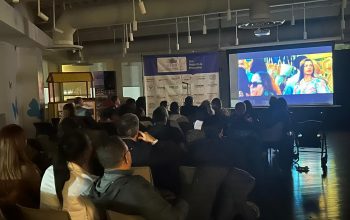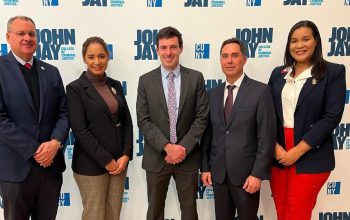news
Johanna Mendelson-Forman ArticulatesNeed for Increased Reliance on Alternative Fuel Sources
June 5, 2007
Johanna Mendelson-Forman, Conflict Resolution and National Security Specialist for the Center for Strategic and International Studies (CSIS), spoke on the impacts of climate change and the challenges they present for government officials and society at large.
She argued that famines, water shortages, and hurricane and flood conditions resulting from climate change significantly affect national and international
security, depleting funds and troops that would otherwise be relied upon for security-related concerns.
security, depleting funds and troops that would otherwise be relied upon for security-related concerns.
Mendelson-Forman stressed that in the case of Hurricane Katrina (2005), unprecedented numbers of state and federal security forces were required to conduct disaster relief work, yet efforts proved insufficient, eliciting debate surrounding adequate disaster relief preparation.
She argued that the impacts of climate change aid in furthering democratic instability. The inability of weak institutions to address extreme weather phenomena, such as drought, often exacerbates conditions of authoritarianism.
Mendelson-Forman spoke of the inherent challenges petroleum-dependent nations will face in the wake of cuts to Middle Eastern petroleum supplies. She argued that in this age of anarchy and scarcity,
already debilitated nations due to crisis can serve as safe-havens for terrorists involved in illegal nuclear arms trade.
already debilitated nations due to crisis can serve as safe-havens for terrorists involved in illegal nuclear arms trade.
According to Mendelson-Forman, incidence of natural and humanitarian disasters will continue to increase. She warned that international response systems will not be able to address the severity of these disasters. She argued that in parts of the world, where significant percentages of the population live in
conditions of severe poverty, increased climate change will guarantee increased poverty. The impact of environmental change will adversely affect developing nations’ capacity to develop sustainably.
conditions of severe poverty, increased climate change will guarantee increased poverty. The impact of environmental change will adversely affect developing nations’ capacity to develop sustainably.

Mendelson-Forman called
for further investigation and increased dependency on renewable energy sources. With regard to reducing gas emissions from motor vehicles, she argued that it is necessary for studies to be conducted that approximate the degree of change necessary to yield significant outcomes.
for further investigation and increased dependency on renewable energy sources. With regard to reducing gas emissions from motor vehicles, she argued that it is necessary for studies to be conducted that approximate the degree of change necessary to yield significant outcomes.
According to Mendelson-Forman, government agencies that carry-out diplomacy and international development work should consider both the short-term and long-term
consequences of climate change. Governments need to prepare for problems of massive migration, and devise new diplomatic agreements regarding refugees. Without such agreements, divisions between nations with resources and those with out will intensify.
consequences of climate change. Governments need to prepare for problems of massive migration, and devise new diplomatic agreements regarding refugees. Without such agreements, divisions between nations with resources and those with out will intensify.
On a positive note, she commended the military’s efforts to reduce gas emissions. “We can’t change our motor vehicle dependent culture,” declared
Mendelson-Forman, “but we can increase our renewable fuel options.”
Mendelson-Forman, “but we can increase our renewable fuel options.”
 She argued that by adopting alternative energy sources (sugar cane, solar, and wind) the Dominican Republic will be able to mitigate the affects of climate change, while simultaneously advancing national economic
She argued that by adopting alternative energy sources (sugar cane, solar, and wind) the Dominican Republic will be able to mitigate the affects of climate change, while simultaneously advancing national economicdevelopment.
She also highlighted the need for the Dominican Republic to work with Haiti in order to confront climate change. In Haiti, potable water shortages associated with drought have spurred migration to the Dominican Republic. She stressed that in this sense, it is to the benefit of both nations to devise a plan to lessen the effects of climate change.





